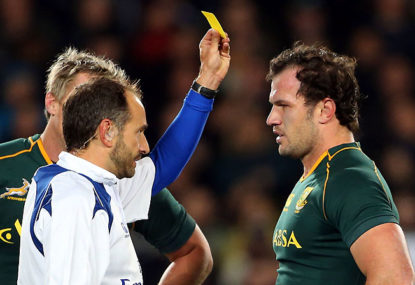There’s been a resurgence of grumpiness recently about referees and nationality bias, with some observers suggesting the non-neutrality of the referee’s origin may result in a non-neutrality of the referee’s decision; not necessarily all the time, but if it happens once, it’s one time too many.
It’s not just in Super Rugby (but some chaps are pretty vocal about that), it’s questionable in the Pro 12 too.
Any time the discussion turns to nationality bias, the credibility of the whole game is undermined. Surely any cross-border game should have a referee from neither country.
Firstly, I don’t believe any referee would ever consciously be biased this way. I can’t imagine a referee would go out with the attitude of giving decisions to the home team. I can’t believe, either, any refs would want to give decisions to the team from their own country.
Referees depend on their impartiality for their career and fairness is built into them from their first training session.
However, human beings can be intimidated. They might be overawed by the atmosphere, impressed by the presence of players on the field or have a briefing by their home union nagging away at the back of their mind. That sort of unconscious bias is a different issue.
Is there any sense at all in allowing the possibility of such an unconscious bias occurring? I think not.
The mind can be fragile under pressure. It can be trained for mental toughness, but that doesn’t guarantee it can hold up when the going gets tough.
Mental toughness is the umbrella term used to group together five general sport psychology targets: confidence, concentration, communication, emotions and motivation.
Since every player is different in terms of these toughness headings, it stands to reason that each referee is different too. And since any one of these might fail during a game for a player, so they might fail for a referee.
We can assume reduction of the need for mental toughness is a good thing in a referee.
We can increase the referee’s confidence, so it’s not a factor, by eliminating self-doubt. We can increase referee’s concentration levels to full. We can standardise communication, we can eliminate emotions and remove motivation.
We could have a robot doing the job. And if we could have a robot doing the job, then I’m sure we would. That would remove the need for mental toughness. But it’s a long way off.
However, let’s minimise ‘individuality’ in the referee’s thoughts and mental toughness. In particular, let’s minimise the idea there may be any bias in the referee’s performance.
Can we remove the thought from the referee’s head: “Am I about to give this decision because I want the team from my own country to win?”
Yes we can. Let’s not have referees in charge of games featuring a team from their home country.
Can we remove the thought from the fans and the governing organisations’ minds: “Is that referee about to give a decision because he wants the team from his own country to win?”
Yes we can. Let’s not have referees in charge of games featuring a team from their home country.
Livelihoods are at stake, careers are being built and the whole credibility of the organisation is on the line. These are important pillars holding up the structure of rugby. Crowds want to see their team winning, but more than that, they want to see their team winning fairly.
To have an element of doubt in that perception of fair play is to introduce the risk the crowd will spend their money on another pastime.
If a sport cannot say it is conducted fairly, with parity of decision-making just, equal and true for both opponents, it is hard to say it is a sport at all.
There’s enough risk in rugby by playing the game, I cannot see any point in putting an avoidable element of risk into the mix.
The players have a hard enough job being asked to conform to the rules of fair-play in the white-hot atmosphere of first-class rugby. It’s not a quiet game, rugby. It’s a testosterone-filled, aggression-fuelled, emotion-driven clash of massive blokes at the edge of human fitness capability, at the peak of mankind’s physicality.
We expect these athletes to conform to the game’s fair-play conventions. We expect the referees to conform to the game’s fair-play conventions. By and large they all do. But why have any risk at all that any bias whatsoever exists?
If it’s about cash, then how much does it cost when a fan switches off or doesn’t go to the game? And not the diehard fans that watch through thick-and-thin either. It’s the marginal ones, who watch when they think it’s all above board. Plenty other things for them to do.
Referees from neutral counties. How difficult can it be?






























































































